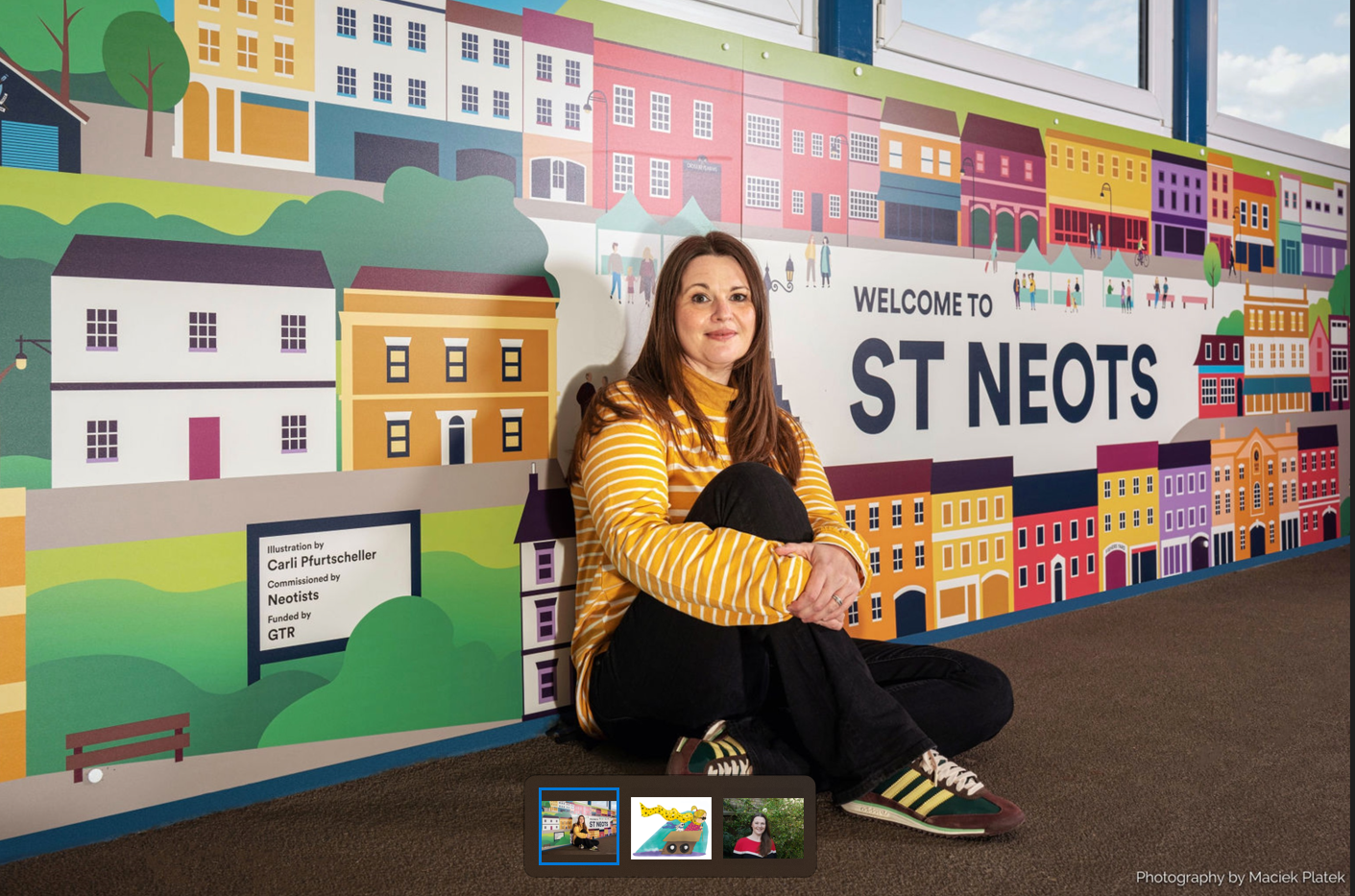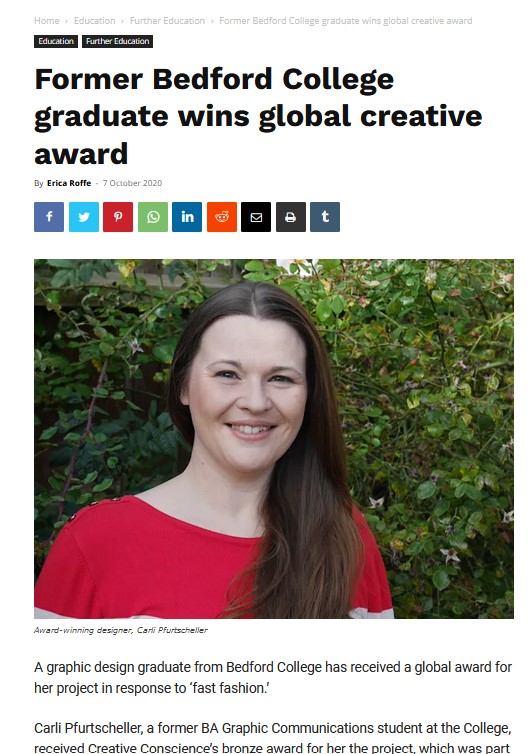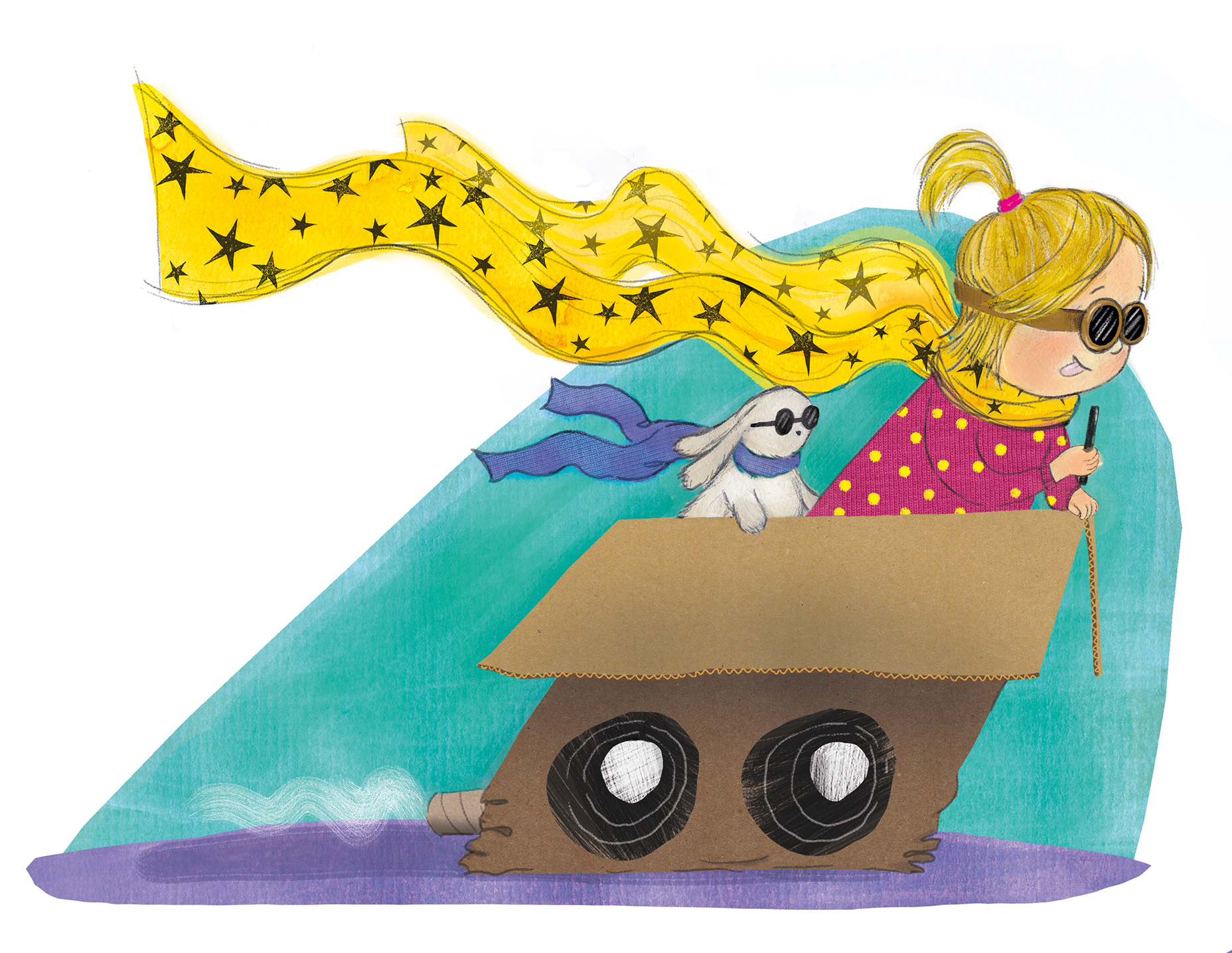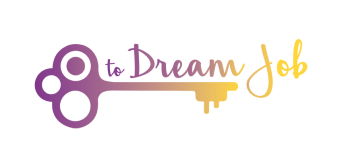
Carli in front of the St Neots rail station mural that she designed. It’s is 47m long.
“Don’t waste time worrying about if it’s possible or whether you can do it. Your own limiting beliefs can really prevent you from having the confidence to try something new.”
Shares Carli Hall (previously Pfurtscheller) the award winning Graphic Designer & Illustrator.
Carli is a great example that it’s never too late to follow your career dreams, whether it’s getting your degree or starting your career all over again.
Altough Carli worked her way up and landed a successful career as a Country Supply Chain Manager in telecom industry without having a degree, she had the nagging feeling that she was in the wrong place, doing the wrong thing and had made the wrong choices. The older she got, the louder the voice became. Thankfully, she listened to it.
Carli used the support of professional career coaches to figure out the path she was really meant to follow. In her story, she shares openly how she overcame the personal and financial challenges that were holding her back from following her career dreams and how she got where she is today, working in a careeer she loves.

Where do you come from and where are you based now?
I was born near Cambridge in the UK to an artist mother and a scientist father. My family moved to the US when I was small, living in California and New Jersey, but we returned to the UK after 10 years. I’ve lived and worked in the south of England (Newbury and Ascot) but have now found myself very close to where I started!
As a child did you have a dream job?
I had a big imagination when I was a child; I would rather have had my head in a book than be running about outside with other children. I wanted to travel, investigate mysteries and do exciting things; my idols were Wonder Woman, Nancy Drew, Indiana Jones (somewhat strangely for a little girl perhaps!), the palaeontologists in Jurassic Park. At any one point I wanted to be an archaeologist, a journalist, an explorer, a writer, an artist, a musician, a detective.
I could never quite decide on any one thing, and had a rather glamourous (and maybe a little bit unrealistic!) idea of what these jobs might be like. At school, I was one of those annoying kids who did well in everything academically. I was curious about anything and everything. I loved learning but I hated school; it’s only in later life that I’ve loved going back to an educational setting.
My favourite subjects were English, science, history, music, art and textiles. When it came to that crucial point as a teenager when you must decide on your path, I struggled to narrow down what I wanted to do. A rather discouraging art teacher, a lack of confidence in my talents, and a fear of creative subjects not leading to a job resulted in my giving up art and sticking with ‘essay’ subjects for ‘A’ level (16-18 years old).
All of my friends went off to Uni; I couldn’t decide what to do …
… and ended up going into work – in pubs, supermarkets, warehouses, various office administration jobs.
As time went by, circumstances at home and my own poor decisions financially and romantically led to my being in £25,000 worth of debt at the age of 25, trapped in work, unable to afford go back to education (and with no clue what subject to study, no wiser than I had been at 16). I made the best of it and worked my way up in the telecoms industry, in ten years going from a logistics admin assistant at Nokia to eventually landing a job as Country Supply Chain Manager for UK & Ireland for Samsung.
The job still carried a huge amount of stress and responsibility in a very male dominated, pressurised and aggressive industry. However, I was finally able to pay off my debts and had entered a stable romantic relationship, which gave me a platform to start thinking about what I wanted to do for the rest of my life.
Since leaving school I had had the nagging feeling that I was in the wrong place, doing the wrong thing and had made the wrong choices. The older I got, the louder the voice became. I constantly felt disappointed in myself and frustrated with my life. I hated sitting in an office every day, doing 9-5. The stress I was experiencing at work, and the mismatch between the things I valued in life and the reality of my life led me to have a depressive breakdown – something had to change.
I was earning a decent amount of money but this was no longer important to me once I’d paid off my debts. I felt I had the potential to do something far more exciting where I could use my creative skills that had lain dormant for years. I had the support of my then husband to pursue a proper investigation and investment into my personal growth. I knew my life felt wrong; but what would feel right?
‘

When and how did you discover direction for your ideal job, career or business?
When I was signed off sick with depression, I began to search for a way out of the trap I was in. I read books on career change. I signed up to a group coaching which led you through exercises to help you find your real purpose. Hearing the stories of people who had climbed out of their own traps into jobs (or vocations) they were passionate about started to make me feel it could be possible for me. I went to see a careers coach who also worked with me to find out what I really wanted in life – through examining my values and what I enjoyed doing.
I took a part time job, giving me more time to explore my options. I took baby steps and experimented with potential directions – taking piano and guitar lessons, looking into writing courses, trying out a beginner’s graphic design taster course. A conversation with the tutor, who had himself formerly been an accountant, gave me the confidence to pursue it further.
I ‘interviewed’ a graphic designer who I had met through a friend to find out what day to day life is like for a freelance designer. It dawned on me that this could be my way into the creative industries; I still didn’t feel confident enough in my artistic talent to go for a Fine Art or Illustration degree but I felt that graphic design could be a more realistic transition for me.
An opportunity to quit my job arrived.
At the time, my then husband was offered a job which meant we would need to move; this seemed like an ideal opportunity for me to quit my job and invest in some training. At the age of 35 I was accepted onto a HND Graphic Communications course at Bedford College, following an interview where I dragged in a massive A1 folder with every piece of art and design I had ever made and basically begged the course leader for a place. Fortunately, he could see my frustration and desperation (and perhaps a modicum of talent) and offered me a place.
The HND turned into a full BA degree through which I also had the opportunity to do internships in design agencies. A chance conversation with one of the associate lecturers led to him offering me some work, and I now work freelance for his design agency as well as picking up my own clients. I won a competition in my final year to design a logo for Wells & Co’s Brewpoint brewery which also led to further paid work both with them and for other local businesses.
After freelancing as a graphic designer for several years and then the pandemic hitting, I once again found myself with itchy feet. I still felt I had more inside me artistically that couldn’t be fulfilled by working to client briefs. I applied and was accepted onto the Cambridge School of Art’s Masters degree in Children’s Book Illustration, following another harrowing interview with the author and illustrator Pam Smy. (Note: It was not really harrowing, I was extremely nervous beforehand, but Pam was lovely and very kind). I now feel qualified to call myself a graphic designer and illustrator even though I still suffer from imposter syndrome on a daily basis.
How did you recognize your genius – what are you best at doing in your career or business?
The thing is, I always knew I had artistic talent and that doing art took me to that place where you’re totally absorbed in what you’re doing; the world just melts away. The problem I had was a lack of confidence in my own abilities, and absolutely no clue how to break into the creative industry.
It wasn’t until I had started the graphic design degree and had the encouragement of the fantastic tutors at Bedford College that I actually started to believe in myself. I had assumed that my previous career and experience would be irrelevant. This turned out to not be the case as many of the skills I had learned in the business world were transferable to this new area (customer relations, project management, understanding business processes).
Throughout the degree I realised that my favourite thing to do is to come up with ideas and solve problems; in fact once I got going, I was bursting with them. I was hungry to learn everything and worked hard to pick up design basics and to understand the software I would need to use professionally. My other favourite thing to do is to make things. This could be painting, drawing, textile art, knitting. I had always done this in my spare time, but now I had ‘permission’ to do it and could even begin to make money from it.
What is your job or position in business now? Why you do what you do right now?
I am so lucky to be able to say that I am doing what I love, right now. But, I need to be constantly learning and growing, which is why I have taken on the MA in Children’s Book Illustration. My aim is to publish a children’s book and longer term (and probably a lifelong journey) is to continually improve and explore my own artistic practice.

This illustration is from an unpublished children’s picturebook called ‘The Box’ as part of Carli’s MA.
Work and life balance – what does it mean to you and how do you keep it?
I struggle with work life balance. Something I want to try to improve on is consistency. I tend to work like mad and then burn out and have to take time out. It’s important to recognise that taking breaks, going for walks, just vegging out or spending time with friends and family is just as important (if not more so) than actually working. This is easier said than done when you’ve got a deadline to meet, or you are striving to make great things.
I also tend to feel guilty if I’m not ‘being productive’ but I’ve come to realise that having perfectionist tendencies is not healthy and shouldn’t be lauded. I hate the ‘hustle’ culture of platforms like LinkedIn and I think generally social media is detrimental to your ability to think and create. I’m as guilty as the next person though of mindless scrolling through Instagram but I try to recognise when it’s becoming unhealthy and go outside or talk to a real live human.
What have you learned on your dream job journey? What were the most difficult things you had to overcome?
I have learned so many things about life and myself on this journey. Change can be really, really hard. One of the hardest things is getting out of your own way and changing your own mindset. I didn’t think it was possible to move out of office work into the creative industry – it seemed far off, cliquey and hard to get into without having rich parents or knowing the right people. But it’s not true.
What I’ve realized is that you’ve got to tell the universe what your intention is by making small steps in the direction you want to go in. It’s amazing what a single conversation can lead to. Each small step will build your confidence. I learned that it’s never too late to make a change; when I went to college at 35 there were other mature students older than me; I’m now doing my Masters at 41. Having said that, my biggest regret is not doing it sooner; I do wonder what I might have achieved by now had I gone to art school at 18.
I have learned to be humble; working as a junior artworker intern on minimum wage, with 18-year-olds, having been a senior manager with my own team, was a hard pill to swallow. But you’ve got to ditch your ego.
I learned to not be afraid or intimidated by people in the arts. If you show willingness to learn and enthusiasm, most people will give you a chance, and everyone had to start somewhere. Most people will also be flattered to be asked about what they do and will be more than happy to give advice or answer any so-called ‘stupid’ questions.
I have also learned that if something isn’t working or is making me unhappy, I ask myself what I can do to change it, if it is within my power to do so, and don’t delay. Don’t waste time being unhappy when you could be working towards something better.
In changing career, I also learned that I am a lot stronger than I thought I was. When you do something like this it makes you less afraid to tackle other challenges.
How did you manage starting your business financially?
Due to my own particular circumstances, I would not have been able to make my change without the financial support of my partner. I needed to go to part time working to give me the space to explore my options, which meant a pay cut. However, I think it could have been possible if I had built up some savings or got a student loan.
It was probably not necessary to do a full BA, it would have been possible to start as a junior designer or artworker with the one or two year HNC/D and an excellent portfolio. For me, I was at the stage in my life where I wanted to work for myself which meant starting out with very little income. But I could have done this job within a design agency which would have eased the financial strain.
I’ve found that work follows work, the more you do, the more people become aware of you and come to you. Having a website helps, as is being active on social media so that people are aware of you and what you do – but I’m terrible at this and hate self-promotion!
Which 3 tips would you give to someone who is right now considering changing jobs, career or starting freelance?
- Dont waste time worrying about if its possible or whether you can do it. Your own limiting beliefs can really prevent you from having the confidence to try something new. And don’t listen to people who say it can’t be done, or that you’re mad to try! Take inspiration from others who have managed it and try to put your fear aside. You won’t regret it, you will however regret the time you’ve wasted not doing it. Small steps is the key!
- Equip yourself with as much help as you can. Read books, get a career coach, speak to people already doing the job you want if you can (ask your friends and family for contacts!). Think of it as a fact finding mission. If you can, find a mentor. For me, my college tutors were probably the most important people in helping me with my change, because they were all practising designers or illustrators and had been there themselves.
- Freelancing is hard, you need discipline and drive to keep going and motivated and can feel scary and risky at times. But the feeling of working for yourself is worth the hard work.
Want more DREAM JOB STORIES directly to your mailbox? Join my newsletter and sign up here
Author: AdriAna Kosovska
I work with women in 30s and 40s to help them to find and thrive in their dream career so their career not only looks good on their CV but also feels great inside.
Certified coach, founder of ZERO TO DREAM JOB and TALENTED WOMAN


Comments